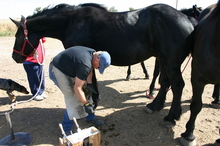Winter horse hoof care often presents scheduling challenges. With winter weather bringing hard frozen ground, snow drifts and colder temperatures in many areas, it becomes difficult for horse owners and farriers to maintain their schedules. Canceled or postponed hoof trimming and horse shoeing appointments are common.

Winter care for horse's hooves
With winter weather bringing hard frozen ground, snow drifts and colder temperatures makes it difficult for horse owners and farriers to maintain schedules, but regular hoof care is important.
Warming conditions during colder months bring mud and with that mud, hoof problems and infections become a concern. Mud can loosen horseshoes and also trap moisture in horse hooves, leading to deterioration or infections such as thrush. If hooves are not examined and picked regularly serious problems can develop.
Stalls should be mucked on a regular basis and clean dry areas should be provided to all horses to save their hooves from the effects of too much moisture.
Horses used throughout winter months generally continue wearing their regular horseshoes. Equines who work outdoors may benefit from cold-weather horseshoes and protective sole pads in many regions.
Snow pads reduce the build-up of snow and ice inside a horse's hoof, while tungsten carbide surfacing on horseshoes can add points or studs to increase traction on slippery surfaces.
Although some farriers may debate this point, many hoof care experts advise horses go barefoot in winter, particularly if the equines are retired, pastured or given the winter months off.
Hoof supplements may help strengthen equine feet in winter. Some farriers recommend the use of feed supplements for stronger hooves in many cases. Equine hoof supplements may contain biotin, amino acids and other healthy ingredients to strengthen hooves, but no hoof supplement can substitute for a healthy equine diet.
Horse owners and stable staffers may be reluctant to schedule farrier appointments in inclement weather, but equine hoof health depends upon this practice. Horse hooves may grow somewhat slower in colder temperatures, but they may chip and crack under such conditions.
